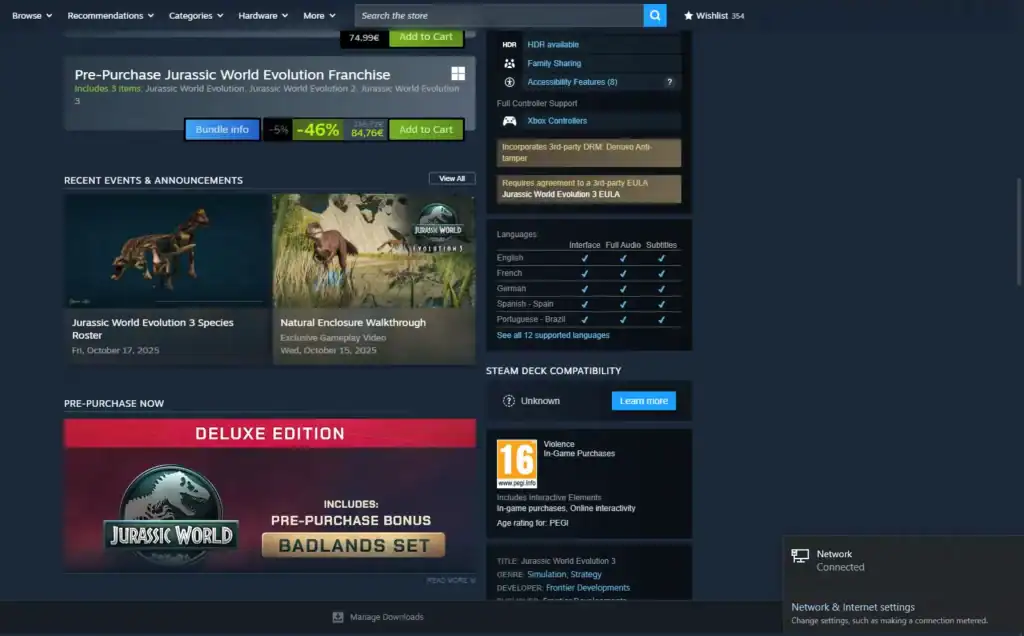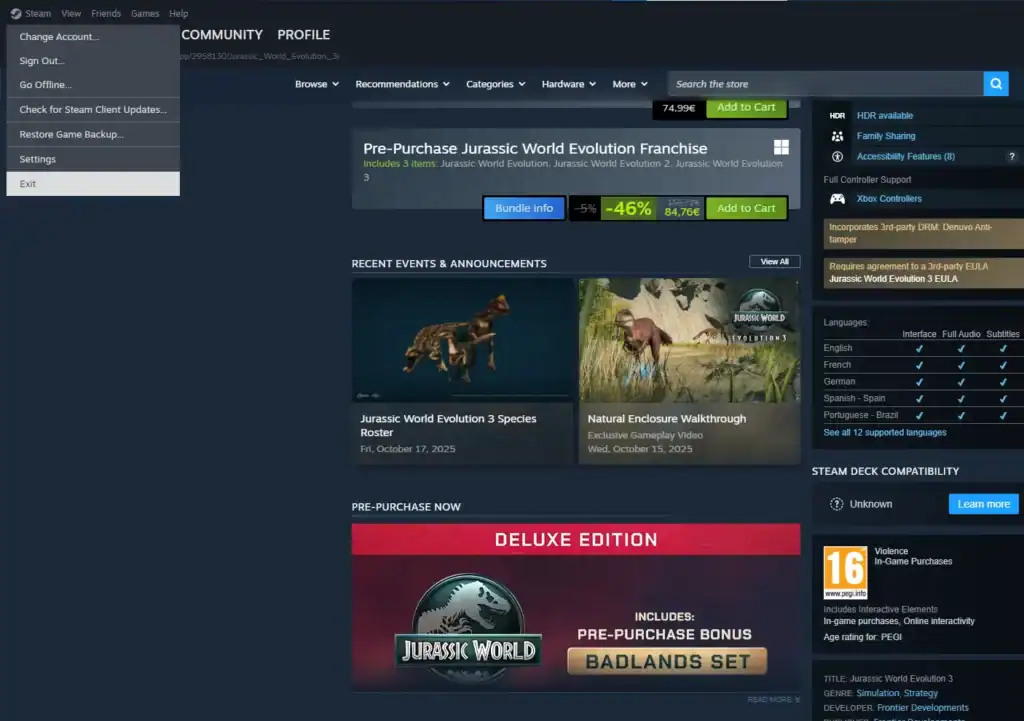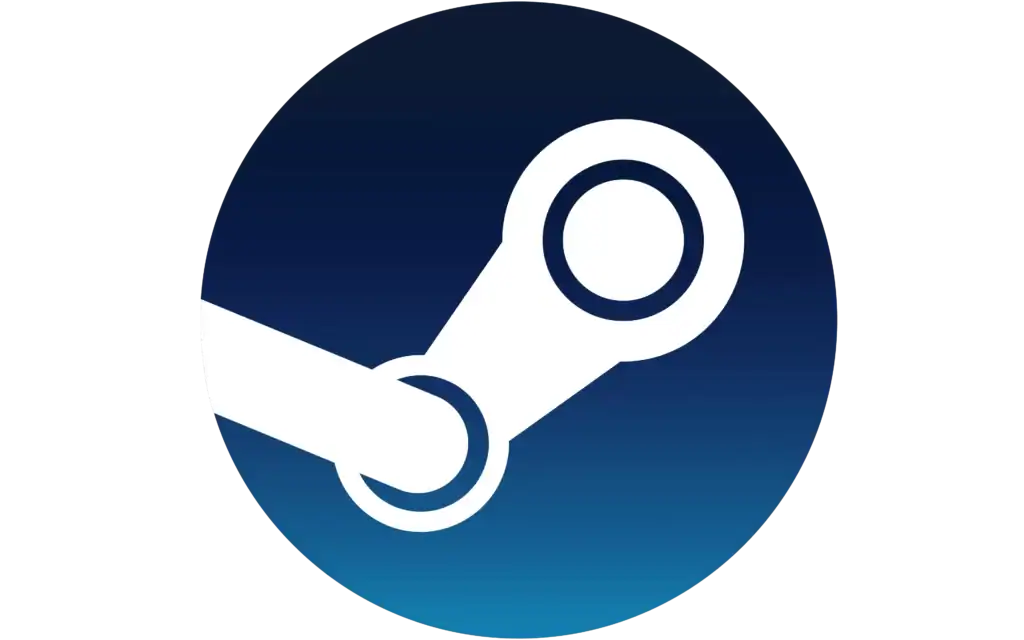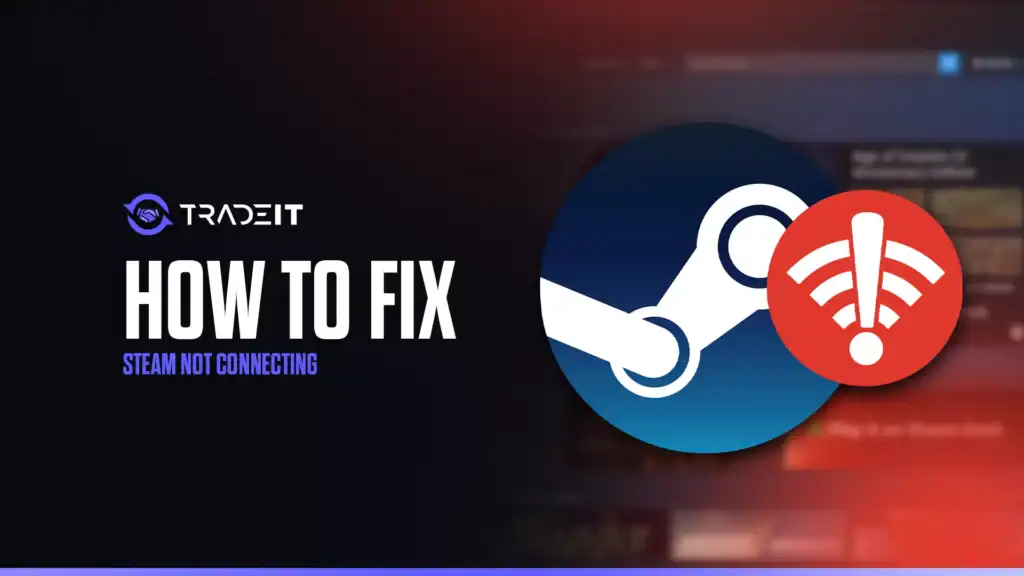Steam is essential for millions of gamers, but the dreaded “Steam Not Connecting” error can disrupt your plans even when your internet is working fine.
Messages like “No Connection” or “Could Not Connect to Steam Network” often appear. This can be caused by server outages, firewall restrictions, corrupted files, or network glitches.
With Steam’s user base exceeding 30 million concurrent players as of October 2025, resolving connection issues quickly is important. This guide walks you through the steps to diagnose and fix the problem, getting you back to your favorite Steam game quickly.
Table of Contents
Step 1: Verify Your Internet Connection

Even if your internet seems functional, subtle issues can block Steam.
What to do:
Open a browser and visit multiple websites like google.com or youtube.com to confirm internet connectivity.
Run a speed test at speedtest.net. Steam needs at least 5 Mbps for stable connectivity and low latency.
Power cycle your router by unplugging it for 30 seconds, then plug it back in to refresh the connection.
Switch to a wired Ethernet connection instead of Wi-Fi for better reliability and stable Steam connectivity.
If other apps work but Steam does not, move to the next step.
Step 2: Check Steam Server Status
Steam servers sometimes go down for maintenance or outages.
What to do:
Visit status.steampowered.com or monitor social media using #SteamDown for real-time updates.
If servers are down, allow 30 minutes to a few hours for Valve to resolve the outage.
If servers are operational, the connection issue is likely local and requires troubleshooting on your device.
Step 3: Restart Steam and Clear Cache

Sometimes, connection issues are caused by temporary glitches or corrupted cache files. Follow these steps to fix the problem:
Restart Steam
Close Steam completely to ensure no background processes interfere with login.
Open Task Manager on Windows or Activity Monitor on Mac to confirm no Steam processes remain active.
Reopen Steam and attempt to log in. This can resolve temporary glitches blocking connection.
Clear Steam Cache (if restarting doesn’t work)
Close Steam completely and check Task Manager to ensure no processes are still running.
Windows: C:\Users\[YourUsername]\AppData\Local\Steam. Mac: ~/Library/Application Support/Steam.
Delete the appcache folder and cached files (keep game data). Relaunch Steam to rebuild the cache and remove corrupted files.
Step 4: Adjust Firewall and Antivirus Settings
Firewalls or antivirus programs can block Steam’s network access.
Steps:
Access Windows Defender Firewall or your system’s firewall to manage app permissions.
Ensure Steam.exe and Steamwebhelper.exe are allowed on both private and public networks.
Temporarily disable third-party antivirus and retry Steam. Also, disable VPNs or use a local server to prevent interference.
On Mac, check System Settings > Network > Firewall and ensure Steam is allowed to connect.
Step 5: Change Steam’s Connection Protocol
Switching protocols can bypass network issues.
Steps:
Right-click your Steam shortcut and select “Properties” to access connection settings.
In the “Target” field, add -tcp or remove it to switch to UDP (e.g., “C:\Program Files (x86)\Steam\Steam.exe” -udp).
Test both TCP and UDP protocols and stick with the one that allows Steam to connect successfully.
Step 6: Flush DNS and Reset Network Settings
Corrupted DNS settings can prevent Steam from resolving servers.
On Windows:
Run Command Prompt as Administrator to ensure proper permissions for network commands.
Type ipconfig /flushdns and press Enter to clear cached DNS entries.
Run netsh winsock reset and restart your PC to rebuild network configurations.
On macOS:
Open Terminal and run sudo dscacheutil -flushcache; sudo killall -HUP mDNSResponder to clear network caches that may block Steam.
This clears network caches that may block Steam.
Step 7: Reinstall Steam (Last Resort)

If all else fails, corrupted Steam files may be the cause.
Steps:
Copy your game files from Steam\steamapps\common to a safe location before uninstalling Steam.
Remove Steam via Control Panel (Windows) or drag it to Trash (Mac).
Get the latest Steam installer from steampowered.com and prepare for reinstallation.
After reinstalling Steam, move your backed-up game files back and log in to resume playing.
Additional Tips
Ensure your network adapter drivers are up to date via Device Manager > Network adapters > Update driver.
Close bandwidth-heavy applications like torrent clients via Task Manager to free up network resources.
If problems persist, submit a ticket at help.steampowered.com with your system specs and error logs.
If you’re using Steam Beta, revert to the stable client via Steam > Settings > Account > Change > None.
Conclusion
The “Steam Not Connecting” error, even with working internet, is frustrating but solvable. By checking your connection, server status, cache, firewall, protocols, and DNS, you can isolate the problem. Reinstallation is a reliable last resort. If everything fails, contact Steam Support.
FAQs
How do I fix Steam not connecting even with internet access?
Check your internet, restart Steam, clear its cache, verify firewall and antivirus settings, and ensure Steam servers are online. Switching connection protocols or flushing DNS can also help.
Why does Steam say “Could Not Connect to Steam Network”?
This usually happens due to server outages, firewall or antivirus restrictions, network glitches, or corrupted Steam cache files.
Do I need to reinstall Steam to fix connection issues?
Reinstallation is a last resort. Try restarting, clearing cache, adjusting firewall/antivirus, changing protocols, and flushing DNS first. If these fail, reinstall Steam and restore your game files.
Can antivirus or firewall block Steam connections?
Yes. Both Windows/macOS firewalls and third-party antivirus programs can mistakenly block Steam. Allow Steam in your firewall and add exceptions in your antivirus settings.
How can I check if Steam servers are down?
Visit status.steampowered.com or check social media platforms for updates with hashtags like #SteamDown to see real-time server status.






